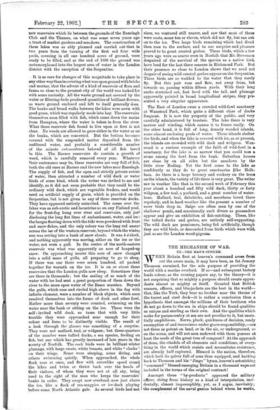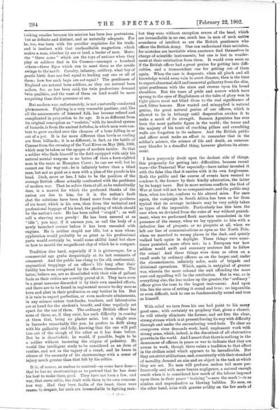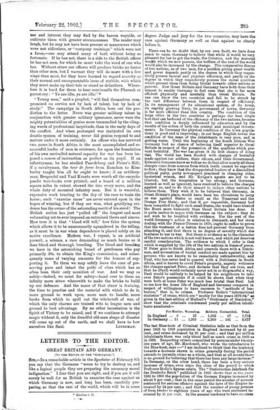THE MECHANISM OF WAR. III.—THE MAN'S OFFICES.
WHEN Britain first at heaven's command arose from out the azure main, it may have been, as fat Jemmy Thomson surmised, for the sole purpose of providing the world with a marine overlord. If so—and subsequent history lends colour, as the evening papers say, to the theory—it is not surprising that so mighty a purpose should create appen- dants almost as mighty as itself. Granted that British seamen, officers, and bluejackets are the best in the world— that, like the Turk, they bear no brother near the throne of the turret and steel deck—it is rather a conclusion than a hypothesis that amongst the millions of their brethren who do not go down to the sea in ships should be found qualities as unique and sterling as their own. And the qualities which make for paramountcy at sea are not peculiar to it, but essen- tially amphibious. Nerve, pluck, quickness of decision, ready assumption of and insouciance under grave responsibility,—are not these as potent on land, or in the air, or underground, as on the ocean, and will not men endowed with them possess at least the seeds of the great tree of conquest ? At the approach of these, the citadels of all elements and conditions, of every- thing in the world which resists and necessitates resistance, are already half captured. Blessed is the nation, therefore, which bath its quiver full of sons thus equipped, and harking back to Thomson and his " Jingo " hymn, heaven's astonishing " command " blessed emerging Britain in a thousand ways not included in the terms of the original contract!
Amongst these " by-products " appeared the military officer, rising from history as a kind of interpolation, inci- dentally, almost imperceptibly, yet, as I argue, inevitably; the complement of the naval genius behind whom he works, bulking smaller because his mission has been less portentous, but as definite and distinct, and as naturally adequate. For he, too, was born with the peculiar requisites for his trade, and is instinct with that unclassifiable magnetism . which makes a man, whether by sea or land, a leader of men. More ; the "three arms" which are the toys of nations when they play at soldiers find in his Cosmos—amongst a hundred others—three Egos which run to meet them as the needle swings to the north. Cavalry, infantry, artillery, what boy of gentle birth does not feel equal to leading any one or all of them ; how few such boys are not equal ? The gentlemen of England are natural born soldiers, as they are natural born sailors, for, as has been said, the twin professions demand twin qualities, and the want of them on land would be more surprising than their presence at sea.
But modern war, unfortunately, is not a naturally conducted phenomenon. Fighting is a very venerable pastime, and, like all the amusements of leisured folk, has become refined and complicated in prbportion to its age. It is as different from its original conception as "roulette," with its involved system of hazards, is from the ancient kottabos, in which men were con- tent to grow excited over the chances of a bone falling in or out of a pot. It is far more different than bowls or curling are from billiards ; it is as different, in fact, as the battle of Cannae from the crossing of the Vaal River on May 26th, 1900, which may be taken as the apogee of modern tactics. So that a soldier who finds himself in the field equipped with only his natural mental weapons is no better off than a keen-sighted man in the maze at Hampton Court ; he can see well, but he cannot see the way out ; he is infinitely better than a blind man, but not so good as a man with a plan of the puzzle in his head. Such, more or less, I take to be the position of the average British officer actually confronted with the problems of modern war. That he solves them at all, as he undoubtedly does, is a marvel for which the profound thanks of the nation are due to him, for it is the nation's fault that the solutions have been found more from the goodness of his heart, which is his own, than from the technical and professional luggage of his head, the packing of which should be the nation's care. He has been called " stupid " ; as well call a starving man greedy ! He has been sneered at as "idle "; you may, if it amuses you, so call the body of a newly launched cruiser before it has been mottled with engines. He is neither stupid nor idle, but a man whose application would probably be as great as his professional parts would certainly be, would some skilful hand but show us how to mould the magnificent clay of which he is compact.
Tradition dies hard, especially if it is picturesque, for a commercial age grabs despairingly at its last remnants of ornament. And the public has clung to the old, sentimental, unpractical trappings of an officer's life long after their futility has been recognised by the officers themselves. The latter, believe me, are as dissatisfied with their role of gallant fools as their critics are secretly proud of it. They have even in a great measure discarded it by their own unaided efforts, and there are to be found in regimental messes to-day men as keen and alert in their profession as any banker in his. But it is vain to expect perfection, or even moderate attainments, in any science unless text-books, teachers, and laboratories are at hand for the student's benefit, and time regularly set apart for the use of them. The ordinary British officer has none of these, or, if they exist, has such difficulty in coming at them that, being no plaster saint, but a single man in barracks remarkably like you, he prefers to drift along with his gallantry and folly, knowing that the one will pull him out of the slough of the other as it has done before. But he is dissatisfied ; he would, if possible, begin to be a soldier without, incurring the stigma of pedantry. He would like intelligent study to be considered as an item of routine, and not as the vagary of a crank, and he hears in silence of the enormity of his shortcomings with a sense of injury much greater than that felt by his critics.
It is; of course, as useless to contend—as some have done— that he has no shortcomings as to pretend that be has done
• his best to make them. good. They have not been a few, and war, that stern critic, has dealt with them in its own remorse- less way. Had they been faults of the heart, there were reason 4:c...despair, for such are irremediable in fighting ;nen :
but they were without exception errors of the head, which are irremediable in no one, much less in men of auch native soundness of intellect as are the British gentlemen who officer the British Army. One can understand their mistakes, for mistakes are inevitable when amateurs find themselves in charge of scientific instruments, but one is lost in wonder- ment at their extrication from them. It would even seem as if the British officer had a great genius for getting into diffi- culties, and a transcendent one for getting out of them again. When the case is desperate, when all pluck and all knowledge would seem vain to avert disaster, then is the time to expect abnormal skill and immortal gallantry from the slim, quiet gentleman with the stars and crowns upon his broad shoulders. But the tears of pride and sorrow which have sprung to the eyes of Englishmen at the tales of glory won in tight places must not blind them to the real significance of such bitter lessons. How wasted and misapplied is natural genius, the great natural genius of our officers, which is allowed to lie in lethargy until desperation awakes it to make a mock of its strength. Samson Agonistes has ever been the most pathetic figure in the world ; the terror and the majesty of his tomb of cracking pillars and crumbling walls are forgotten in its sadness. And the British public and officer must make an effort to remember that in the soldier's science, the science of life and death, an unneces- sary blunder is a dreadful thing, however glorious its atone- ment.
I have purposely dwelt upon the darkest side of things, this propensity for getting into difficulties, because recent wars—the Transvaal War especially—have rather invested it with the false idea that it carries with it its own forgiveness. Both the public and the course of events have seemed to condone it, the former by their kindly admiration, the latter by its happy issue. But in more serious conflicts the God of War at least will not be so compassionate, and the public may then, when too late, conform to his altered mien. For once again, the campaign in South Africa has been so far from typical that its average incidents may be very safely taken as types of the impossible. Particularly has this been the case when we deviated from the rules of war without punish- ment, when we performed flank marches unmolested in the presence of the enemy, when we lay opposite to him with, a defective line of picquets, or no picquets at all, when we left our line of communications as open as the North Pole, when we marched to wrong places in the dark, and quietly walked back again in daylight. These things were some- times punished, more often not; in a European war how seldom would swift and summary sentence fail to follow the crime ! And these things were done as often on a small scale by ordinary officers as on the larger, and, under the circumstances, infinitely safer, scale of brigade and divisional operations. Which, again, is untypical of greater war, wherein the more colossal the unit offending the more sure and appalling will be the retribution. But in war, as in everything else, the less makes up the greater, the " ordinary " officer gives the tone to the hugest instrument. And upon him lies the onus of setting it sound and true; no impossible, or even difficult, task to one so fundamentally sound and true as himself.
With relief we turn from his one bad point to his many good ones ; with certainty we prophesy that, given a chance, he will utterly eliminate the former, and set free the clear, strong stream which is at present forcing its way with difficulty through and under the encumbering weed-beds. To clear an overgrown river demands work, hard, unpleasant work with strong arms, which, indeed, is the discutient of all obstructive growths in the world. And I assert that there is nothing in the demeanour of officers in peace or war to indicate that they are averse to work, though there exists a tradition to that effect in the civilian mind which appears to be ineradicable. But they are strict utilitarians, and, consistently with their standard of morality, demand an aim and an object in the task at which they are set. No men will perform useless toil more per- functorily and with more brazen negligence, a natural enough result when it is considered how much of the labour imposed upon them in their peace "training "—save the mark !—is as aimless and unproductive as blowing bubbles. No men, on the other hand, seize with greater avidity on the few seeds of use and interest they may find by the barren wayside, or cultivate them with greater strenuousness. The reader may laugh, but be may not have been present at manceuvres which were not ridiculous, or "company trainings " which were not a farce,—one may attend many of both without being so fortunate. If he has not, there is a side to the British officer he has not seen, for which he must take the word of one who has. Without straw our officers will produce bricks no faster than other men, but I warrant they will do more with a few wisps than moat, for they have learned to regard scarcity as their normal and unaugmentable issue of stubble, with which they must make up their tale or stand as defaulters. Where- fore it is bard for them to hear continually the Pharaoh or parrot-cry : "Ye are idle, ye are idle!"* "Young men," said a prophet, "will find themselves com- promised on service not by lack of talent, but by lack of study." The campaign in South Africa bore out the pre- diction to the letter. Never was greater military talent in conjunction with greater military ignorance, never were the mighty potentialities of genius more trammelled by the cling- ing weeds of professional ineptitude, than in the early days of the conflict. And when prolonged war instituted its own drastic system of training, never did genius respond to and mature under it more certainly. An officer who has survived two years in South Africa is the most accomplished and re- sourceful leader of men in existence, for upon the foundation of his own unrivalled natural capacity for war has been im- posed a course of instruction as perfect as its pupil. If an infantryman, be has studied Paardeberg and Pieter's Hill; if a cavalryman, the tour de force from Ramdam to Kim- berley taught him all he ought to know; if an artillery- man, Bergendal and Vaal Krantz were worth all the encyclo- paedic text-books ever printed; and a board of a million square miles in extent showed the tiro every move, and the whole duty of mounted'.infantry men. But it is wasteful, expensive work trusting' to the day of the race to train the horse ; such "exercise races" are never entered upon in the hopes of winning, but if they are won, what gratifying evi- dence has the owner of the astounding merit of his steed! The British nation has just "pulled off " the longest and most exhausting set-to ever imposed on untrained thews and sinews. How true it is that "blood will tell," how false the system which allows it to be unnecessarily squandered in the telling, as it must be in war when dependence is placed solely on its native excellence. Modern war, I repeat, is an artificial pursuit, a science, a race demanding as much brains as it does blood and thorough breeding. The blood and breeding we have in the astonishing brand of gentlemen who pay primarily 30s. to obtain the King's commission, and subse- quently sums of varying amounts for the honour of sup- porting it. To them we may safely leave the care of pre- serving pure and intact the pride of class which has so often been their only munition of war. And we may as safely—indeed, we must for safety—hand over to them an infinity more straw wherewith to make the bricks to build up our defences. And the name of that straw is training, the time to practise and the material with which to do it, more ground to work upon, more men to handle, more books from which to spell out the witchcraft of war, of which the only charms are trained wits to league men and ground to best advantage. By no other incantation is the Spirit of Victory to be raised, and if we continue to attempt magic without it, only the dreadful old-man shape of disaster will come up out of the earth, and we shall have to bow












































 Previous page
Previous page